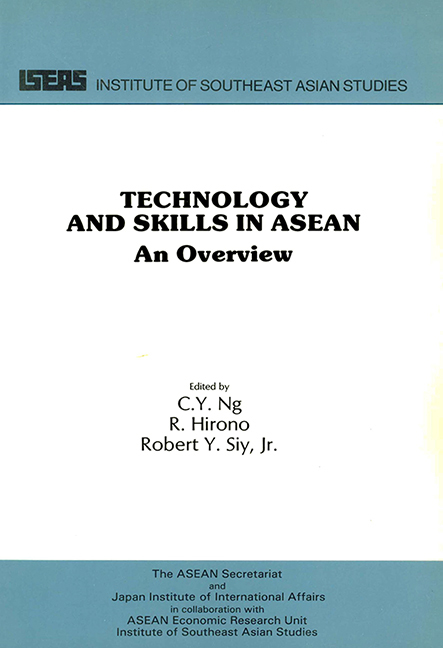Book contents
- Frontmatter
- Contents
- Foreword
- Preface
- PART ONE ASEAN OVERVIEW
- PART TWO SECTION 1: JAPANESE OVERVIEW
- 1 Industrialization, Technology Transfer and Skills Enhancement in Asean: A Japanese View
- 2 Major Issues of Technology Transfer, Adaptation, Diffusion, and Development, and Skills Enhancement
- 3 Technology Transfer and Development in Asean: Machinery and Electronics Industries
- 4 Regional and International Arrangements For Technology Transfer
- 5 Conclusions and Recommendations
- PART TWO SECTION 2: JAPANESE EXPERIENCES IN TECHNOLOGY TRANSFER
- The Editors
1 - Industrialization, Technology Transfer and Skills Enhancement in Asean: A Japanese View
from PART TWO - SECTION 1: JAPANESE OVERVIEW
Published online by Cambridge University Press: 09 November 2017
- Frontmatter
- Contents
- Foreword
- Preface
- PART ONE ASEAN OVERVIEW
- PART TWO SECTION 1: JAPANESE OVERVIEW
- 1 Industrialization, Technology Transfer and Skills Enhancement in Asean: A Japanese View
- 2 Major Issues of Technology Transfer, Adaptation, Diffusion, and Development, and Skills Enhancement
- 3 Technology Transfer and Development in Asean: Machinery and Electronics Industries
- 4 Regional and International Arrangements For Technology Transfer
- 5 Conclusions and Recommendations
- PART TWO SECTION 2: JAPANESE EXPERIENCES IN TECHNOLOGY TRANSFER
- The Editors
Summary
Introduction
The development of technologies and skills has long been considered essential to the industrialization of nation-states both in the West and in the East. To the extent that industrialization was interpreted as synonymous with economic development and that even the earliest starter of industrialization in its modern sense, the United Kingdom, had its predecessors elsewhere in Asia and Europe, the development of modern technologies and skills in any nation-state included the transfer, adaptation and diffusion of the technologies and skills imported from overseas.
Looking at the crucial importance of technologies and skills in the historical process of industrialization in the East and West, and acknowledging that the development of modern indigenous technologies and skills would be a time-consuming and long-term process, most of the developing countries bent towards rapid industrialization today have placed a priority on the transfer, adaptation, and diffusion of modern technologies and skills from overseas in their respective national development programmes. The ASEAN countries have been no exception to this, and technology and skills enhancement has become a key word in their national development efforts.
The ASEAN countries, however, soon realized that the development and diffusion of modern technologies and skills, whether indigenous or imported, would require the availability of skilled, technical, administrative, professional and managerial manpower, together with appropriate government policies for generating such manpower resources and channelling financial resources for such development and diffusion, as well as international environments conducive to this. To facilitate this process, the ASEAN countries have installed a variety of investment incentives and reorganized educational and training programmes at the national level and obtained financial and technical assistance on bilateral and multilateral bases, while joining other Third World countries at the international level in introducing international codes of conduct on technology transfer and transnational corporations.
The purpose of this chapter is to review the general patterns of industrialization, foreign manufacturing investment, and the diffusion of modern technologies, whether indigenous or imported, in the ASEAN countries in the process of their rapid industrialization.
- Type
- Chapter
- Information
- Technology and Skills in ASEANAn Overview, pp. 73 - 86Publisher: ISEAS–Yusof Ishak InstitutePrint publication year: 1988



